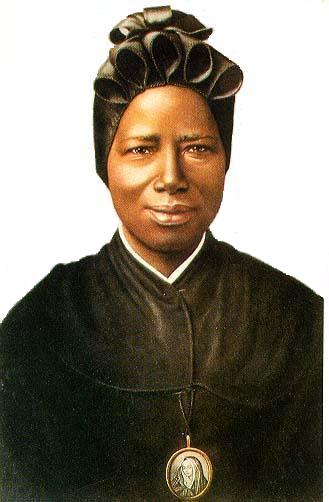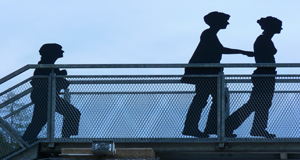Mercy and Compassion in Action: Opposing Human Trafficking
February 9, 2016
'In Mercy we touch the hearts of those who are in misery, In Mercy we’re touched by them and feel their strength and courage.'
-Circle of Mercy by Jeannette Goglia rsm (Americas)
'Mercy is as simple as sharing bread, as wide as loving people into wholeness as challenging as working for global justice.'
 As we once more celebrate the feast of Saint Josephine Bakhita (See image right), a former Sudanese-born slave who became a Canossian Religious Sister in Italy and was canonised in 2000, may we gain courage and inspiration from her life. On 8 February, her feastday, we pray for survivors and victims of human trafficking and for the transformation of the hearts of all traffickers.
As we once more celebrate the feast of Saint Josephine Bakhita (See image right), a former Sudanese-born slave who became a Canossian Religious Sister in Italy and was canonised in 2000, may we gain courage and inspiration from her life. On 8 February, her feastday, we pray for survivors and victims of human trafficking and for the transformation of the hearts of all traffickers.
Today we are becoming all too familiar with the televised images of destruction of the earth. There are much fewer images of the sufferings of the women, children and men who are snared by human traffickers, resulting in loss of freedom, and physical or sexual abuse. Human trafficking, for the most part, is an invisible tragedy.
From the vantage point of Mercy International Association (MIA) Global Justice, I am aware of many of the actions taken by Mercy sisters and their partners in ministry in response to the global human trafficking issue. From suggestions offered by Mercy leaders throughout the world in 2010 MIA took, as one of its focus issues Opposing Human Trafficking. Much has happened in this area in recent years.
Initially one or two sisters from the global Mercy Family in each continent were involved. The core of the involvement was around Raising Awareness of the issue among the sisters, in their localities and in their ministries. Due to the hidden nature of human trafficking many believed that it happened, yes, but not in their area or locality. The reality was different. Very soon it was realised that no one can work on this issue alone and networking and collaboration with other local, national and international groups was necessary.
 Raising awareness continues and many sisters and co-workers of the Mercy family around the world are involved. Educating young people and others on the issue is a major step in the prevention of human trafficking, as is the provision of education and other needs to marginalised children and those abandoned. In a New Zealand Mercy school awareness raising was done through drama and a musical. What is clear is that networking and collaborating is the most effective way to address this global issue, not just for prevention, but for advocacy work and the repatriation of those who have been trafficked.
Raising awareness continues and many sisters and co-workers of the Mercy family around the world are involved. Educating young people and others on the issue is a major step in the prevention of human trafficking, as is the provision of education and other needs to marginalised children and those abandoned. In a New Zealand Mercy school awareness raising was done through drama and a musical. What is clear is that networking and collaborating is the most effective way to address this global issue, not just for prevention, but for advocacy work and the repatriation of those who have been trafficked.
Mercy Investment Services in the U.S developed a programme to help trafficked children and those at risk using the principles of ECPAT- End Child Prostitution, Pornography and Trafficking, an international organisation. In 2013, the Irish Congregation developed a campaign to protect children in the hospitality sector. It, too, is underpinned by the ECPAT principles, collaborating with the Irish Hotel Federation, plus the national network of NGOs working to eliminate human trafficking. Members are also involved in raising awareness, and others are involved through working with the faith based group, Act to Prevent Trafficking (APT).
“In Mercy we welcome those the world has left rejected.” Sisters contribute in different ways to the protection of victims and survivors of human trafficking as in the ‘Women@theWell Centre‘ project at King’s Cross in Central London, where Mercy sisters and their partners in ministry provide a variety of services. Victims and survivors of human trafficking can receive short-term accomodation, as well as the regular services provided at the Centre.
In Kansas City, Missouri, sisters befriend women caught in prostitution, among them survivors of human trafficking. They accompany these women on their journey, offering whatever support is needed. Some sisters are involved with Bishops conferences and dioceses, others with civic offices and law enforcement groups. It is often the personal encounter with a trafficked person that pulls at the heart strings and leads a person into this work.
Individual sisters have found their talents in organising or facilitating training days for professionals, who through their work come into contact with trafficked victims. For example, the sisters in Newfoundland, in collaboration with with other congregrations and partners, have organised very successful training days. They also have brought the ‘Diabola’ drama from Belfast over to Newfoundland, as it highlights the horror of the various aspects of human trafficking.
Many of the Mercy sisters in Australia are active members of ACRATH - Australian Catholic Religious against Trafficking in Humans, a collaborative group of religious, both female and male, from different congregations. Among their many activities the group works closely with members of Federal and State Parliaments to advocate for improved laws both to protect trafficked people and to prevent trafficking.
The Mercy presence at the United Nations brings the issues of human trafficking and the educational and other needs of children to the forefront in their advocacy work.
It is recognised that what is known about human trafficking is only the tip of the iceberg. The same is true of the work of the Mercy family with and on behalf of victims and survivors and opposing human trafficking. This article is just a flavour of some of that work.
One of the many stories that touched me was that of the three Mercy sisters in Georgetown Guyana, who took an initative on behalf of trafficked young people at a nearby mining area and called a public meeting. As I wondered how their work progressed I heard that one of the sisters on celebrating her 90th birthday, said that the greatest gift that she got was being instrumental in setting up a centre for trafficked people in her area. (CCASA)
 It is never too late to begin.
It is never too late to begin.
What type of human trafficking is in the shadows in your area?
Do you know of any local organisation working on this issue?
Is there anything you think you could do?
'In Mercy we heal the pain of those who are in sorrow, In Mercy we’re healed by them and see the face of hope.'
Messages to: CatherineGibbons rsm - Staff MIA Global Action.
February 2016

